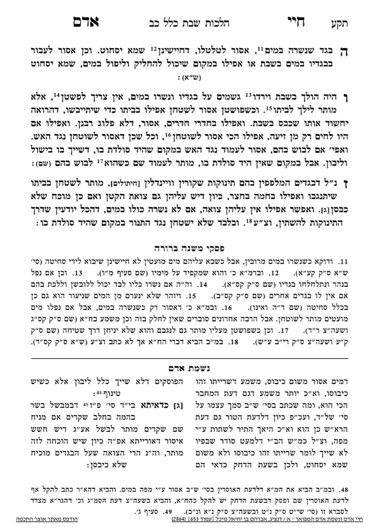We are skipping to siman 8, where the Chayei Adam discusses removing dirt from a garment with something other than water. The Chayei Adam writes that if the dirt is still wet, it is muttar to remove it with one’s fingers or with a knife, and it is not considered tochain. If it were to crumble into small pieces, it would be a concern of tochain, but the Chayei Adam is explaining that while it is still wet, there is no concern of tochain. Regarding melabein, if scraping off the dirt will leave the garment with a stain, it is not considered an act of libun to scrape off the dirt, since it was clearly not effective.
The Chayei Adam continues, and writes that rubbing two sides of the garment together is generally considered to be an effective method of cleaning it, so it is considered libun and is assur. However, it is muttar to clean it by rubbing the affected area on the opposite side of the garment. But, if the dirt is dry, even rubbing the opposite side of the garment is still an issur of tochain. Nevertheless, since the tochain is a melacha she’eina tzricha legufa, it would be muttar to ask a non-Jew to remove the dirt, because it is a shvus d’shvus (the derabanan of amira l’achum and the derabanan of melacha she’eina tzricha legufa). In general, we apply the leniency of shvus d’shvus to cases of loss, mitzvah, and kavod habriyos, and it is considered a kavod habriyos issue to walk around with a stain on one’s clothing.
If there is only a thin layer of tzoah, such that there is no actual tzoah but only a stain, the Chayei Adam writes that it is muttar to remove it directly in order to daven. The Mishnah Berurah does not accept this heter.
The Chayei Adam writes that if there is a food stain on a garment, it is muttar to remove it. The Mishnah Berurah has difficulty with this heter, which we will explain in the upcoming shiur, be’ezras Hashem.
Summary
When removing dirt from a garment without washing it with water, there is a potential concern for tochain and melabein.
- If the dirt is wet, there is no concern for tochain, and if it will leave a stain, there is no concern for melabein. Additionally, if it is wet, it is muttar to rub the opposite side of the garment to remove the stain.
- If the dirt is dry, even rubbing the opposite side of the garment is assur due to tochain. However, it is muttar to ask a non-Jew to remove it
- The Chayei Adam permits removing a food or tzoah stain directly, but the Mishnah Berurah disagrees.



